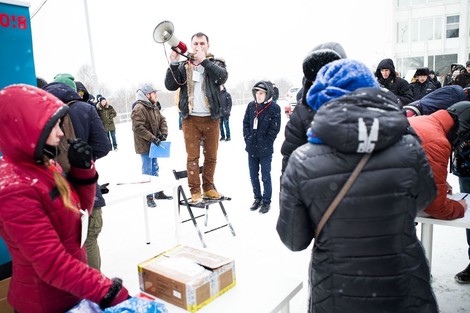Your podcast discovery platform
Curious minds select the most fascinating podcasts from around the world. Discover hand-piqd audio recommendations on your favorite topics.

piqer for: Globalization and politics Global finds
Sezin Öney, originally from Turkey, is based in Budapest and Istanbul. She her journalism career as a foreign news reporter in 1999 and she turned into political analysis as a columnist since 2007. Her interest in her main academic subject area of populism was sparked almost decade ago; and now she focuses specifically on populist leadership, and populism in Turkey and Hungary. She studied international relations, nationalism, international law, Jewish history, comparative politics and discourse analysis across Europe.
Putin's Enemies Exploit Growing Rural Anger With the Kremlin
In Russia, 18 March 2018 is the presidential election day. No surprises are expected, Vladimir Putin has no serious rivals. His most popular critic Alexey Navalny has been blacklisted by the Russian media in general, prosecuted for fraud and, most recently, was officially disqualified from running for president. While Putin takes care of being and appearing fit; he actually seems to be having a difficult time energizing the electorate as voting turnout is going down. Alternatively, time is on young Navalny's side.
The 41-year-old opponent of Putin has been organizing protests since years. Though he cannot be running in these elections, Navalny wants to de-legitimize Putin’s inevitable victory. For that purpose, he is leading the organization of protests all around Russia. He claims to have 84 regional offices and 200,000 volunteers, and he is urging Russians to opt out of casting ballots and becoming a party to the impending "managed victory". In Ragozin's words;But no matter what happens on election day, it’s the future that matters more. With Russia’s semi-stagnant economy, international sanctions and small-scale wars in Ukraine and Syria, liberal opposition that once existed only in big urban centers has begun to spread to smaller cities and towns that are considered government strongholds. With the prospect of Putin, 65, entering his last term as president, Navalny’s followers foresee—perhaps a little optimistically—a Russian spring.
While Putin may still be clinging onto power, his political maneuvering space may be shrinking. Ragozin quotes a recent survey of 4,000 people from all regions by the Institute of Sociology of the Russian Academy of Sciences, which found out that; for the first time since 2003, a majority favor change over “stability”. And "stability" was the key word in Russian political discourse since Putin has been in power. But nowadays, "change" may be in the air, as the Russians seem to be perceiving status quo as "corruption and poverty".
